Why Audra McDonald Loves Ann Arbor
When singer Audra McDonald performed in Ann Arbor in 2011, we asked her what she loves about Ann Arbor audiences. She returns on September 17, 2015.
Our Very Own Audra McDonald Round Up

Audra McDonald. Photo by Andrew Eccles.
We can’t wait for the return of six-time Tony Award winner Audra McDonald. She’ll perform at Hill Auditorium on September 17, 2015.
UMS has had the honor of presenting Audra McDonald a few times over the course of recent year, and the singer has been very generous with her time with students, staff, and more.
Here’s a round up of our favorite Audra McDonald moments in the past few years.
1. The one where she raves about Ann Arbor audiences:
2. The one where she sings a birthday song for Hill Auditorium:
3. The one where she answers questions from University of Michigan students:
4. And of course, the one where we got to ask a few questions.
What are your favorite Audra McDonald moments?
View from seats at Audra McDonald’s performance
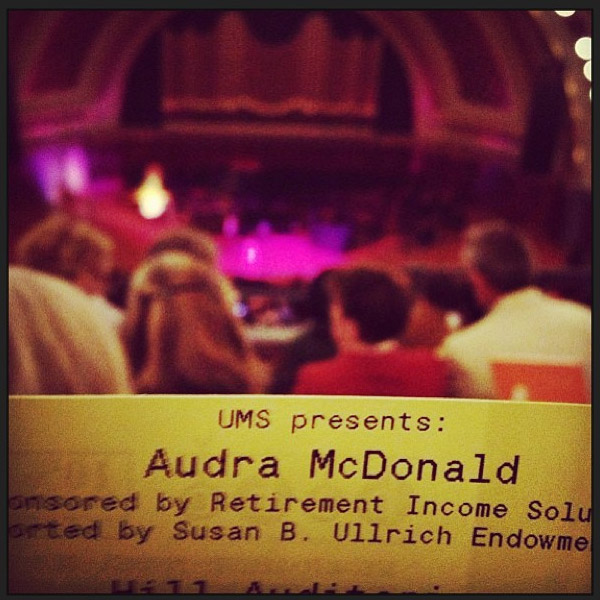
We love this photo from the seats at Audra McDonald’s performance by @tayloranorton. Share your photos with us on social media using #umslobby.
The Heart of History: Reconsidering the Great American Songbook
Editor’s note: Looking to hear selections from The Great American Songbook live? Audra McDonald performs on September 15, 2013.
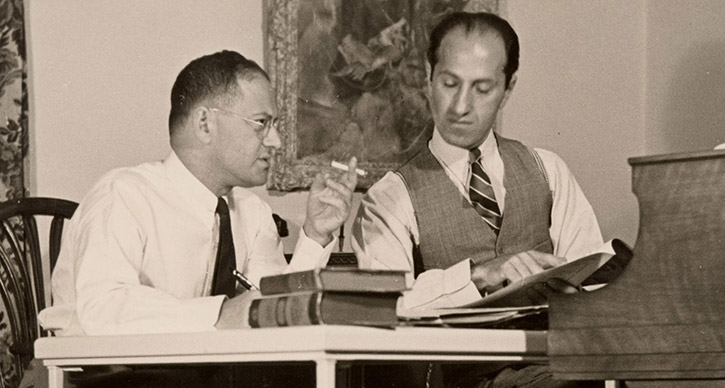
Photo: Ira and George Gershwin, Beverly Hills, 1937 (Ira and Leonore Gershwin Trusts (used by permission).
If a nation kept a diary, it would be in its songs. Song is where poetry meets praxis, where the imagination hits the dance floor and the ineffable finds expression in the everyday. Verse envelops life’s detail to offer both prosaic insight and poetic pleasures; yet, in song, music expands the emotional richness of lyrical syntax, transforming words into dreams, disappointments into wisdom. Cast in the delight of melody, harmony, and rhythm, song thrives even without specific meaning. In lyrical enigma resides possibility, whether in Schubert’s Lieder or on Top 40 radio, song’s ambiguities invite association to make the popular deeply personal. Some becomes “our song,” as music collides with living. These human riches of song may well transcend time and place, yet song is equally historic, preserving ideas and events that forged a path to the present.
In the United States, entries in the Great American Diary of Song include ballads by a signer of the Declaration of Independence—Francis Hopkinson—and spirituals that tell of the strengths, sufferings, and hope of African American slaves. The legendary songwriters of Tin Pan Alley, of Broadway, of Hollywood strove for hits to catalyze immediate commercial success, yet surprisingly often they created classics that captured the concerns, optimism, and challenges of the times. Irving Berlin’s “Puttin’ on the Ritz” (1929), Yip Harburg and Jay Gorney’s “Brother, Can You Spare a Dime?” (1932) and “Over the Rainbow” (1939) by Harold Arlen and Harburg explore fundamental human themes while they articulate a time of traumatic change from exuberance to Great Depression and its aftermath in American history.
The Gershwin brothers had a particular knack for catching the spirit of the age and for all time. Their many love songs, such as the unknown gem “Ask Me Again” (rediscovered by Michael Feinstein and finally introduced to the public in a 1990 production of Oh Kay!), offer more than tales of heart meets heart, they tell of the everyday as universal—here in the nervous and joyous first blush of infatuation and the dreamy ideals of romance. “Fascinating Rhythm,” in contrast, merges the energy and optimism of the Twenties with its explosive cultural tension that marks jazz as the signal success of Harlem’s artistic renaissance and its quest for Civil Rights. Or maybe it’s the iconic lullaby “Summertime” from Porgy and Bess, arguably the most frequently recorded song in audio history (in competition with only Paul McCartney’s “Yesterday”) and one now forever associated with beloved UMS artist Audra McDonald in her 2012 Tony Award winning performance as Bess. The Gershwins’ creative strength is on vivid display in each rendition; their songs grow ever richer through the artistry of countless performers and performances.
It is thus with both great excitement and equal humility that the University of Michigan’s American Music Institute at the School of Music, Theatre & Dance announces the George and Ira Gershwin Critical Edition. Created in partnership with the Gershwin family, this all-new series of publications will — for the first time — bring the rigor of scholarly editing to the realization of the Gershwins’ musical legacy. On the stages of Hill Auditorium, Britton Recital Hall, and Power Center, faculty artists and student performers will bring their interpretive energies to the Gershwins’ work to inform and refine the editorial process. The project as a whole will inspire a range of courses, talks, and research examining the cultural contributions of the Gershwins in context of a broad accompanying transformation of American life, from the Victorian Age through the Jazz Age up through today.
Video: Audra McDonald sings “Summertime” from The Gershwins’ Porgy and Bess.
An encyclopedia never to be finished, the Great American Songbook has much to say about the past as well as the present, making it a vital locus for research and study as well as performance on campus and in the classroom and on campus. Song does more than entertain, it celebrates, it informs, it heightens the moment as it encodes ideology for analysis. Most importantly, song gives history a heart. Whether given voice in the interpretations of the art’s great singers, or by a raucous chorus of kids in the family car, song recruits the beauty of the ages as a tool for understanding, here and now.
UMS Hill Auditorium Documentary
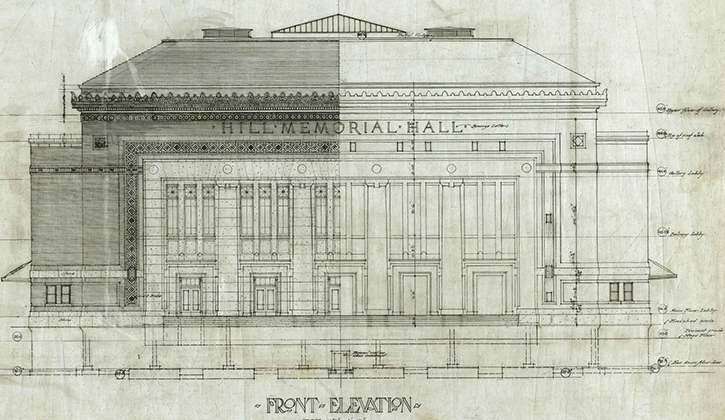
Photo: Hill Auditorium front elevation. Image courtesy of the Albert Kahn Collection, Bentley Historical Library, University of Michigan.
Hill Auditorium opened on May 14, 1913, and UMS celebrated the venue’s 100th birthday throughout our 2012-2013 season.
“A Space for Music, A Seat for Everyone” is the UMS documentary about the past century of UMS performances in the auditorium. The documentary had its world premiere on February 2 in Hill Auditorium at a free day-long celebration event. The film has been nominated for several awards, and earned the “Best Historical Documentary” Michigan EMMY.
View the full documentary film
Synopsis
Hill Auditorium, a building incredible not only due to its rich history and remarkable acoustics but also due to its function as a cultural incubator for the arts community in southeastern Michigan, has united a diverse community of music enthusiasts for 100 years. Through concert recordings, news articles, and anecdotal interviews, this documentary will provide historical context for UMS performances in Hill Auditorium while highlighting the evolving community function of the venue.
Length and format: 56 minutes, widescreen, HD.
Additional Videos
30 second trailer:
60 second trailer:
Ann Arbor’s two Big Houses:
Singer Audra McDonald wishes Hill Auditorium a happy birthday:
The history of Hill Auditorium’s Frieze Memorial Organ:
Sponsored by AnnArbor.com, part of the MLive Media Group. Funded in part by the Michigan Humanities Council.
Audra McDonald on Ann Arbor’s warm, generous audiences
In the spirit of the holidays, we want to say thank you for your part in making our performances great. Our artists agree. Just check out the video above in which Audra McDonald praises Ann Arbor’s warm, smart, and generous audiences.
[VIDEO] A Q&A with Audra McDonald and U-M Musical Theatre Students
UMS presented Audra McDonald at Hill Auditorium on Nov 4 as part of the 11/12 season. Prior to the performance, Audra met with U-M Musical Theatre students for a Q&A session.
A transcript of the Q&A session is here.
Fifteen Minutes with Fame: The Audra McDonald Q&A
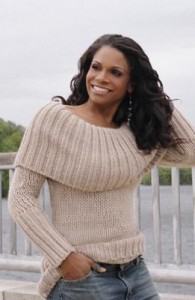 Editor’s Note: Audra McDonald performed at Hill Auditorium on November 4 as part of 11/12 UMS Season. A brief Q&A session with U-M Musical Theatre students preceded the performance. Sarah Bichsel, UMS Social Media Intern, attended and transcribed this session.
Editor’s Note: Audra McDonald performed at Hill Auditorium on November 4 as part of 11/12 UMS Season. A brief Q&A session with U-M Musical Theatre students preceded the performance. Sarah Bichsel, UMS Social Media Intern, attended and transcribed this session.
When I was eight years old, my mother brought home the new Disney version of Annie on VHS (this was still a time when you could purchase a VHS tape without the store clerk bursting into laughter). My mother purchased Annie knowing that I loved both musicals and the prospect of stardom, and as we watched it together, I’m sure she was gratified by the sight of my attempts to sing along. The movie became one of my favorites, mainly because I believed I could sing better than the girl who played Annie, and it was not uncommon to find me in the living room belting out “Tomorrow” in front of the TV. There was one person in the film, th0ugh, for whom I had the utmost reverence, and that was Audra McDonald. When she came on the screen, I was transfixed as she glided effortlessly over each note. Her voice was sacred, her music ethereal. Even as I grew older and drifted farther from my interest in performance fame, I remembered her and cheered as she triumphed in one concert after another. I hope that you will all be as inspired by her as I was and still remain.
From the Q&A Session:
Why don’t you tell us about the program tonight?
Audra McDonald: I’m a bit of an eclectic personality so it’s going to be a mixture of stuff that you’ve heard me sing before, and some new things. I’m doing some Julie Styne, Adam Guettel, Jason Robert Brown, and then some new composers. I’ll do some that’s modern and some that comes from before you were born–whatever speaks to my heart.
You studied voice at Juilliard. Do you continue to study and have voice lessons?
AM: You must always continue to study voice. I had a voice lesson the night of my performance at Carnegie Hall! A dancer wouldn’t stop doing their barre. What Juilliard gave me was the idea that I had this classical instrument and without my studies there, I wouldn’t have discovered this part of me. I wanted to be a belter. I didn’t want to sound too arch. [She sings an exaggerated, Wagnerian opera note]. But I found that the classical part of my voice is a part of who I am.
How do you approach developing a character?
AM: For me it’s all about finding. Finding the why, finding the verb, finding the arc within the play. I am always searching for the truth. It doesn’t change from role to role. I’m always looking for that arc.
Did you ever study acting specifically?
AM: I never studied acting. Programs were very specific at Juilliard. You’re either in the voice department, or the drama department. Juilliard since I’ve left has become a bit more open…at the time I studied you couldn’t do both.
How did you get involved with Private Practice?
AM: It was interesting. The show was a spin off from Grey’s Anatomy, a Shonda Rhimes production, so it had a certain pedigree. It scared me so much. And in the beginning I had to learn that being in front of the camera wasn’t about giving my entire self. It was an opportunity to learn and get comfortable. You have to bring it down and use those smaller muscles in front of the camera.
What do you like about performing a role versus performing in concert?
AM: What I love about a role where you play the same part is that you get a million chances to get it right. There are some people with whom you can set a watch to their performance. For me if it doesn’t feel alive and true, that doesn’t work. If you mess up one night, you can try again the next night. My director has this saying, “turn the page,” which means that even if you thought that for that night you were brilliant and awesome, don’t hold onto it, turn the page. You have to move on the next night. With concert work, I love the spontaneity of it. It’s nice to not have the fourth wall. You’re actually able to talk to the audience and say, “Hey there! What’d you have to eat?”
What about the diversity of the arrangements on your CDs?
AM: Without music directors we are nothing. They help give you fresh perspective. You say to them, “Is there a way to make this funnier or sadder or faster,” and they scribble it down and say here I know what you mean.
How do you balance family life and your career?
AM: My family is the most important thing to me. I’ve read a quote from Renee Fleming that says, “I don’t get paid to be on stage, I get paid to be away from my family.” How does one balance it? I don’t know. Today anyone who wants to have a child can have a child, and you make sacrifices on either end for that family. My family always says to me “sing fast.” It’s all wonderful, but I keep thinking about Tony Award nights. None of it feels real until I’m back on the couch at home having a burger with my kid.
When did you know you wanted to be a performer?
AM: I’ve never done anything else. My dad’s family was very large. They used to say, “oh she’s the dramatic one,” “calm down, it’s just a thunderstorm.” I always knew that I could sing. In my family I have the cute voice. I have some massive voices in my family. “That’s cute,” they all said, that’s what she’s going to do. I can’t do anything else. Don’t ask me to cook!
How did you get involved with GLAAD?
AM: My boyfriend was in Hair with Gavin Creel at the time. After Prop 8 passed, Gavin got very vocal, and the Hair cast got very vocal, and Will [my boyfriend] would come home every night going RAWR! They both gave me the idea of doing the rally. We convinced Austin Eustice to do an equality march and cancel a show for a DC march. Tonight in honor of this cause, I will be doing Gershwin’s “He Loves and She Loves.” Actually, I’ve been thinking about doing a song to combat Herman Cain, “Loving You Is Not A Choice it’s Who I Am.” It’s from Passion.
How do you balance Broadway and classical?
AM: They’re one in the same now. Getting the voice centered, getting the body out of the way constrictively. My coach’s philosophy is always healthy, healthy, healthy and then from there we can find the colors of the voice.
How did you transition from school to real-world auditions?
AM: I was sneaking out of school to audition! The transition was more about going to a classical sound. For me I started to feel better about who I was once I started auditioning, even though I wasn’t necessarily landing. I felt more secure because people weren’t saying “oh you said deh vieni wrong.”
How do you make choices in your career?
AM: I just knew that I wanted to perform. I’m curious about different aspects of the field—I’m open to it all. I think that what’s important is not saying no to certain opportunities—saying I want to try! When they asked me to perform at Carnegie, I’d never sung that high, and I’d given up the classical way, and it should have been no thank you, but I said, “Okay I’ll try!” Go at it with 100% commitment, with passion. Be willing to fall flat on your face!
How does it feel to have work created for you?
AM: It’s an incredible honor. You develop really deep collaborative relationships with directors. It’s like having a suit tailor-made for you. There’s the excitement about having things recognized about you that you might not see yourself. You say, “I can’t go that dark in this role.” Then someone looks at you and yes, you can go darker, you can, and you need to explore this. It has been a growing experience for me.
What are some of the relationships that have impacted you?
AM:
I have a lot of mentors…I also consider them family. Lonny Price is who I call my gay husband. I gave him a wedding ring a few years ago! Really, I did! He’s someone I run every project by. There’s Zoe Caldwell—she scared me so much when we first met and now we talk about everything–I named my daughter after her. And Barbara Cook, who is finally being honored by the Kennedy Center this year! There are just certain people I run all my artistic decisions by.
11/12 Additional Events
Several additional events will also be presented as part of the UMS 11/12 season, and can be purchased as part of the choose-your-own Monogram Series.
Subscription packages go on sale to the general public on Monday, May 9, and will be available through Friday, September 17. Current subscribers will receive renewal packets in early May and may renew their series upon receipt of the packet. Tickets to individual events will go on sale to the general public on Monday, August 22 (via www.ums.org) and Wednesday, August 24 (in person and by phone). Not sure if you’re on our mailing list? Click here to update your mailing address to be sure you’ll receive a brochure.
Audra McDonald
Friday, November 4, 8 pm
Hill Auditorium
She may be a Juilliard-trained four-time Tony Award-winning singer and actress who has released four solo albums and performed with every major orchestra in the US, but Audra McDonald is not one to rest on her laurels. McDonald returns to the concert stage after her last UMS appearance in 2005; since that time, she has made her Houston Grand Opera debut, won her fourth Tony (for A Raisin in the Sun), played Olivia in Shakespeare’s Twelfth Night at The Public Theatre Shakespeare in the Park, performed at the White House for President Obama, and spent four years on the ABC series “Private Practice.” Her break from the television series allows her time to return back to her musical theater roots, including this Hill Auditorium concert.
Canadian Brass
Sunday, November 27, 4 pm
Hill Auditorium
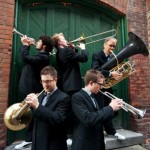
Five tremendous brass musicians — each a virtuoso in his own right — form the legendary Canadian Brass. With an international reputation as one of the most popular brass ensembles today, Canadian Brass features brass standards as well as a wide-ranging library of original arrangements created especially for them, including the works of Renaissance and Baroque masters, classical works, marches, holiday favorites, ragtime, Dixieland, big band, Broadway, and popular songs and standards. This Thanksgiving-weekend concert is sure to start your holidays off with a bang. The hallmark of any Canadian Brass performance is entertainment, spontaneity, virtuosity and, most of all, fun.
Handel’s Messiah
Ann Arbor Symphony Orchestra
UMS Choral Union
Jerry Blackstone, conductor
Saturday, December 3, 8 pm
Sunday, December 4, 2 pm
Hill Auditorium
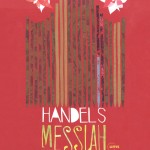
The Grammy Award-winning UMS Choral Union (2006 “Best Choral Performance” for William Bolcom’s Songs of Innocence and of Experience) launches the holiday season with its signature work, Handel’s glorious oratorio Messiah. An Ann Arbor tradition in the beautiful surroundings of Hill Auditorium, these performances are ultimately the heart and soul of UMS, connecting audiences not only with the talented people on stage, but also with the friends and family who attend each year. Start off your holiday season with a spirited “Hallelujah!”
Sweet Honey In The Rock
Friday, February 17, 8 pm
Hill Auditorium
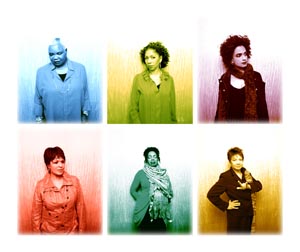
For over three decades, Sweet Honey In The Rock has used her voice to celebrate our collective humanity, singing about the challenging issues of racism; social, economic, and environmental injustice; equal rights and greed that seem to be pulling our nation apart. The group has built a distinguished legacy as one of the most celebrated ambassadors of a cappella music, fusing five scintillating and soulful voices with the texture, harmonic blend, and raw quality that is indigenous and true to authentic a cappella music. In the tradition of artists in action — this is the group that sang on the steps of the Supreme Court on behalf of the University of Michigan’s affirmative action case — Sweet Honey taps the spirit, encourages audiences to think, asks them to reflect, and inspires them to make a difference in their communities.
American Mavericks
San Francisco Symphony Chamber Concert
Michael Tilson Thomas, conductor
Meredith Monk and Joan La Barbara, vocals
Sunday, March 25, 4 pm
Rackham Auditorium
This final concert of the four-concert San Francisco Symphony American Mavericks residency features 17 musicians from the San Francisco Symphony performing chamber music. The festival celebrates the creative pioneering spirit and the composers who created a new American musical voice for the 20th century and beyond. American mavericks explored every sound that a full orchestra could make, but they also composed fascinating, and invigorating, chamber music. This concert features intriguing chamber works from composers whose music will shape the decades to come.
Program
Meredith Monk | New Work
Lukas Foss | Echoi
Morton Subotnick | From Jacob’s Room
David Del Tredici | Syzygy
Return to the complete chronological list.


